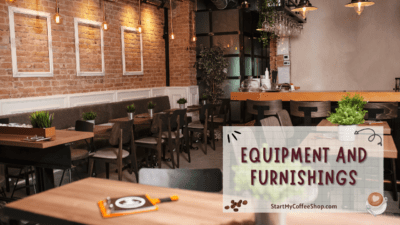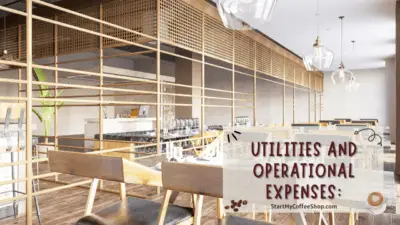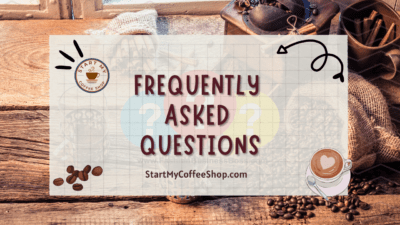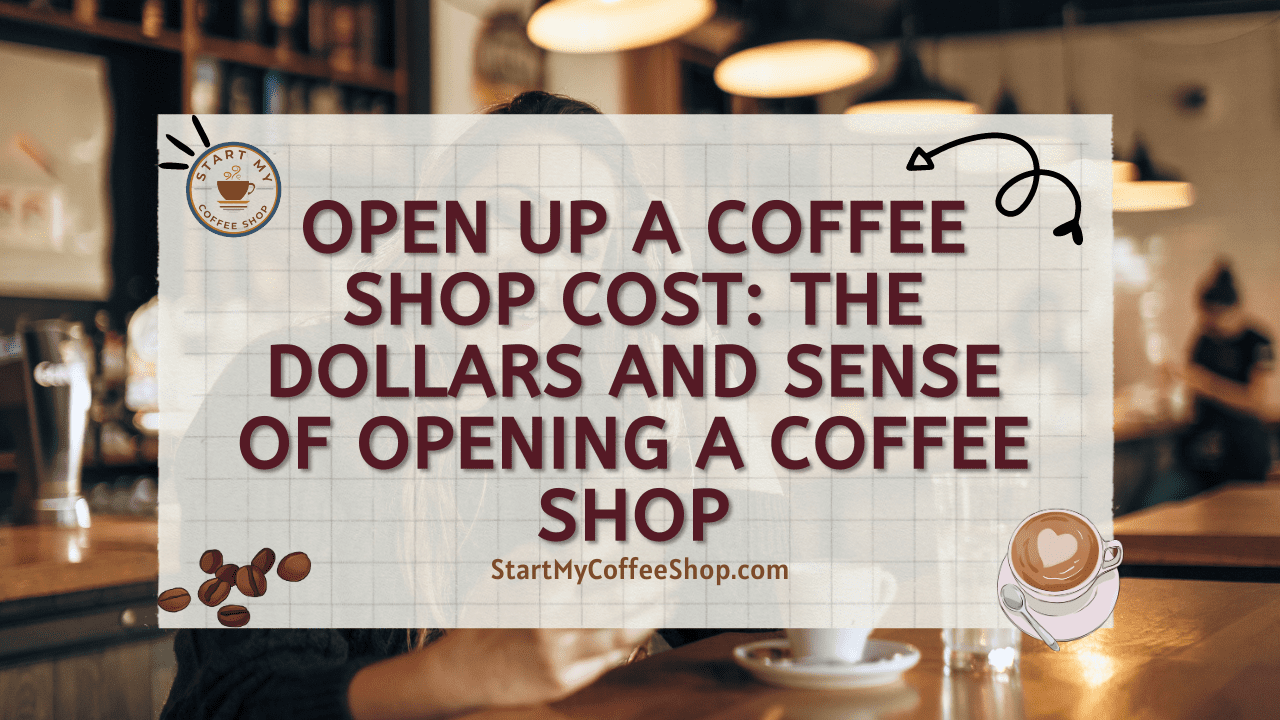Opening a coffee shop is a dream for many caffeine enthusiasts and aspiring entrepreneurs. However, turning this dream into reality requires careful planning and a thorough understanding of the costs involved.
The costs to open a coffee shop vary based on factors like location, size, equipment, permits, renovations, staffing, inventory, and marketing. But on average, it can range from $80,000 to $300,000 or more to bring your cozy coffee haven to life
In this article, I will delve into the various expenses associated with opening a coffee shop.
Location
Several factors come into play when considering the ideal location, including foot traffic, proximity to target customers, and rental prices. These factors not only impact the initial investment but also have ongoing effects on the business’s expenses.
Prime locations in busy city centers often boast high foot traffic, providing a steady stream of potential customers. However, such locations typically come with higher rental costs due to the demand. On the other hand, opting for a location in a suburban or less crowded area may offer more affordable rental options, albeit with potentially lower foot traffic.
Understanding the target customer base is crucial when assessing location choices. For instance, if the target audience consists of busy office workers, a location near business districts or office complexes would be advantageous. Similarly, a coffee shop targeting college students might thrive in an area close to universities or educational institutions.
By carefully evaluating the trade-offs between foot traffic, rental prices, and target customers, coffee shop owners can make informed decisions about their location. A thorough market analysis, including studying demographics and competitors in the area, can provide valuable insights into the potential customer base and demand.
Renovations and Interior Design
Creating a welcoming and cozy coffee shop requires careful attention to renovations and interior design. The process of transforming a space involves various costs, including structural modifications, flooring, lighting, furniture, fixtures, and décor.
Structural modifications may be necessary to optimize the layout and flow of the coffee shop. This could involve changes to walls, doors, or windows to enhance space utilization. Flooring choices can range from hardwood to tiles, each with its cost considerations. Lighting plays a crucial role in setting the ambiance and mood, with options such as pendant lights, track lighting, or cozy lamps.
Investing in comfortable and functional furniture is essential for creating a space where customers can relax and enjoy their coffee. From tables and chairs to cozy seating areas, furniture choices should align with the coffee shop’s theme and accommodate the anticipated number of customers.
Fixtures and décor elements add character and personality to the coffee shop. These can include artwork, wall decorations, signage, plants, and other decorative items that contribute to the overall ambiance. Balancing aesthetics with the available budget is important to create an inviting atmosphere while keeping costs manageable.
Collaborating with professional interior designers or seeking inspiration from great coffee shop designs can help strike the right balance between functionality, aesthetics, and budget. The goal is to create a space that reflects the coffee shop’s brand, resonates with customers, and provides an enjoyable experience that keeps them coming back for more.
Equipment and Furnishings
Equipping your coffee shop with the necessary tools and furnishings is a substantial investment that is crucial for its smooth operation. Coffee machines, grinders, espresso makers, blenders, refrigerators, dishwashers, and other equipment are essential for the preparation and storage of beverages and food items. High-quality equipment ensures the consistency and excellence of your offerings, enhancing the overall customer experience.
In addition to equipment, you’ll need to consider the furnishings that contribute to the atmosphere and functionality of your coffee shop. Tables and chairs should be comfortable and arranged in a way that maximizes space utilization.

Counters provide a designated area for transactions and interaction with customers, while shelves and storage units help organize supplies and inventory efficiently.
When selecting equipment and furnishings, it’s important to strike a balance between quality, durability, aesthetics, and budget. Researching reputable suppliers, reading reviews, and seeking recommendations from industry professionals can help you make informed decisions. Investing in durable equipment and well-designed furnishings ensures that both customers and employees have a comfortable and efficient space to enjoy and work in.
Remember, the quality of the tools and furnishings you choose reflects your commitment to providing an exceptional coffee shop experience.
Read more about Cost to Start Dunkin’s Coffee Shop: Analyzing the Cost Factors
Permits and Licenses
Compliance with local regulations and obtaining the necessary permits and licenses is a crucial steps when opening a coffee shop. These requirements ensure that your business operates legally and meets the health, safety, and operational standards set by local authorities. It’s important to consider the costs associated with permits, health inspections, business licenses, zoning permits, and other legal requirements when planning your budget.
Permit costs can vary depending on the location and the specific regulations in your area. Health inspections are typically conducted to ensure that your coffee shop meets the necessary hygiene standards and may incur a fee. Business licenses are essential for legally operating your coffee shop and are subject to fees that vary depending on the jurisdiction.
Zoning permits are necessary to ensure that your coffee shop is located in a designated commercial zone. The costs associated with zoning permits may depend on factors such as the size of your establishment and the zoning regulations in your area.
To navigate the intricacies of these processes, it is advisable to consult with local authorities and professionals who specialize in business regulations. They can guide the specific permits and licenses required for your coffee shop and help you understand the associated costs.
Staffing and Training:
Building a competent and friendly team is essential for providing exceptional service in your coffee shop. When considering the costs involved, you should account for expenses related to hiring, training, wages, benefits, and uniforms.
The hiring process may involve advertising job openings, conducting interviews, and performing background checks. These steps ensure that you assemble a team of skilled and qualified individuals who align with your coffee shop’s values and customer-centric approach.
Training programs play a crucial role in shaping your team’s performance. Investing in comprehensive training ensures consistency in coffee preparation, customer service, and operational procedures. This empowers your employees to deliver a high standard of quality and professionalism, contributing to a positive customer experience.
Wages and benefits are ongoing costs associated with maintaining a motivated and loyal team. Offering competitive wages and desirable benefits can attract and retain talented individuals. Additionally, providing uniforms not only creates a cohesive and professional image but also helps employees feel a sense of belonging and pride in their roles.
Inventory and Supplies:
Stocking up on various consumables is an ongoing expense for a coffee shop. This includes coffee beans, tea leaves, milk, syrups, pastries, and other ingredients necessary for your menu offerings. Managing these costs efficiently requires developing strong relationships with suppliers and estimating monthly inventory requirements.
Establishing partnerships with reliable suppliers can ensure a steady and consistent supply of quality ingredients. By negotiating favorable pricing and terms, you can optimize your inventory costs without compromising on the quality of your products.
Estimating monthly inventory requirements is crucial to prevent overstocking or running out of essential items. Analyzing sales data, monitoring consumption patterns, and considering seasonal variations can help you make accurate projections and adjust your ordering quantities accordingly.
In addition to the core ingredients, you’ll also need to invest in essential supplies such as packaging, napkins, cups, lids, and other disposable items. These items contribute to the overall customer experience and should be factored into your budget.
Marketing and Branding:
Promoting your coffee shop is an essential aspect of attracting customers and building a strong brand presence. To effectively allocate your budget, it’s crucial to invest in various marketing strategies that can help create brand awareness and cultivate a loyal customer base.
Online advertising and social media campaigns are powerful tools to reach a wider audience. Platforms like Google Ads or social media platforms allow you to target specific demographics and geographical locations, maximizing the impact of your marketing efforts. Engaging content, enticing visuals, and interactive posts can help create a strong online presence and generate interest in your coffee shop.
Offline marketing efforts are equally important. Eye-catching signage, both inside and outside your establishment, can capture the attention of passersby and draw them in. Print materials, such as flyers or brochures, distributed in the local community or neighboring businesses, can also contribute to brand visibility.
Collaborating with local influencers or bloggers who align with your target market can be an effective way to generate buzz and reach a wider audience. Organizing events or participating in community initiatives can help forge connections and build a positive reputation within your local area. Additionally, offering loyalty programs or incentives to encourage repeat business and word-of-mouth recommendations can contribute to customer retention and growth.
Utilities and Operational Expenses:

Running a coffee shop entails a range of operating expenses that should be carefully considered for accurate financial planning. Utility costs, including electricity, water, heating, and internet, are essential for the day-to-day operation of your establishment. Monitoring and managing these expenses can help optimize energy usage and control costs.
Insurance is crucial to protect your coffee shop against potential risks, such as property damage, liability claims, or employee-related incidents. Consulting with insurance providers specializing in the food and beverage industry can help you determine the appropriate coverage and associated costs.
Accounting services play a vital role in ensuring accurate financial records, tax compliance, and payroll management. Hiring professional accountants or using accounting software can streamline financial processes and provide valuable insights for making informed business decisions.
Investing in a reliable point-of-sale (POS) system is essential for efficient order processing, inventory management, and sales tracking. Merchant fees associated with credit card transactions should also be considered when evaluating operational costs.
Maintaining a clean and sanitary environment is crucial for a coffee shop. Budgeting for cleaning supplies, equipment maintenance, and repairs ensures a hygienic and inviting space for both customers and employees.
Read more about Cost To Open Coffee Ice Cream Shop: From Investment to Indulgence
Contingency Fund:
Building a contingency fund is crucial for a coffee shop to handle unforeseen expenses and navigate temporary downturns in business. Unexpected repairs, equipment breakdowns, marketing emergencies, or seasonal fluctuations are common occurrences that can strain your finances. By allocating a portion of your budget as a safety net, you can ensure the smooth operation of your coffee shop and be prepared for unexpected challenges.
A contingency fund provides financial security and peace of mind, allowing you to address unforeseen expenses without compromising the quality of your products or services. It serves as a buffer, enabling you to overcome obstacles and maintain the stability and resilience of your coffee shop, even in uncertain times.
Seeking Professional Advice:
Seeking guidance from professionals such as accountants, lawyers, and business consultants is invaluable when opening a coffee shop. Their expertise can provide valuable insights into various aspects of your business, including financial planning, legal requirements, tax implications, and overall business strategies.
Accountants can assist in setting up a sound financial structure, managing cash flow, and ensuring compliance with tax regulations. Lawyers can help navigate legal aspects, such as drafting contracts, obtaining necessary licenses, and protecting intellectual property. Business consultants can offer strategic advice, market analysis, and guidance on operational efficiency.
By consulting with these professionals, you can make informed decisions, mitigate risks, and optimize your coffee shop’s progress. Their expertise and guidance will enable you to navigate potential challenges with confidence and build a solid foundation for your business.
Summary
Opening a coffee shop is an exciting venture that requires careful consideration of the costs involved. From choosing the right location and investing in equipment to obtaining permits, hiring staff, and marketing your brand, each aspect plays a crucial role in financial planning.
By conducting thorough research, seeking professional advice, and creating a comprehensive budget, you’ll be well-prepared to turn your passion for coffee into a thriving business.
Frequently Asked Questions

Question: How much does location impact the cost of opening a coffee shop?
Answer: Prime locations in bustling city centers may have higher rents, while suburban or less crowded areas may offer more affordable options.
Question: Are there ongoing expenses beyond the initial investment for a coffee shop?
Answer: Yes. These include rent, utilities (electricity, water, heating), employee wages, inventory and supplies, marketing and advertising, insurance, maintenance, and other operational costs.
Question: Are there any legal requirements or permits needed to open a coffee shop?
Answer: Yes. These may include business licenses, health inspections, zoning permits, and compliance with local regulations.
To learn more on how to start your own coffee shop checkout my startup documents here
Please note: This blog post is for educational purposes only and does not constitute legal advice. Please consult a legal expert to address your specific needs.

Hi! I’m Shawn Chun
My adventure in coffee began when I first launched my first coffee shop back in the early 2000s. I had to figure out so many things on my own and to make it worse within 2 years of opening two large corporate coffee chains moved in just blocks away from me!
As I saw smaller and even some larger coffee shops in the neighborhood slowly lose customers to these giant coffee chains and slowly close up shop, I knew that I had to start getting creative…or go out of business.
I (like you may be) knew the coffee industry well. I could make the best latte art around and the foam on my caps was the fluffiest you have ever seen. I even had the best state-of-the-art 2 group digital Nuova Simonelli machine money could buy. But I knew that these things alone would not be enough to lure customers away from the name brand established coffee shops.
Eventually, through lots of trial and error as well as perseverance and creativity I did find a way to not only survive but also thrive in the coffee/espresso industry even while those corporate coffee chains stayed put. During those years I learned to adapt and always faced new challenges. It was not always easy, however, in the end, I was the sole survivor independent coffee shop within a 10-mile radius of my location. Just two corporate coffee chains and I were left after that year. All told the corporate coffee chains took down over 15 small independent coffee shops and kiosks and I was the last one standing and thriving.
Along the years I meet others with the same passion for coffee and I quickly learned that it is not only “how good a barista is” that makes a coffee shop successful, but the business side of coffee as well.
Hence why I started this website you are on now. To provide the tools and resources for up and coming coffee shop owners to gain that vital insight and knowledge on how to start a coffee shop successfully.
Stick around, browse through my helpful blog and resources and enjoy your stay! With lots of LATTE LOVE!
Shawn







